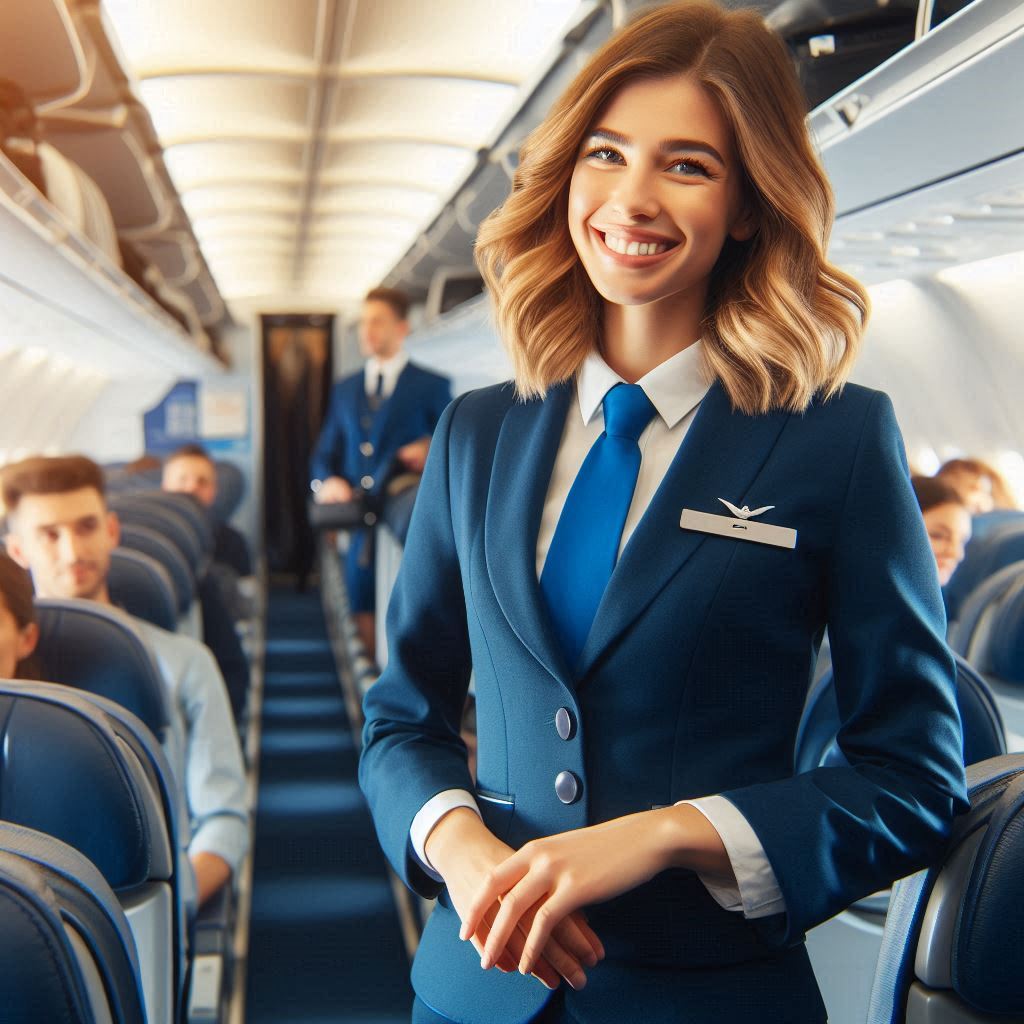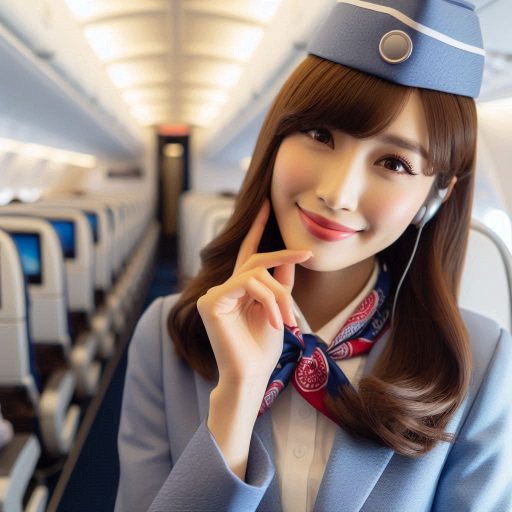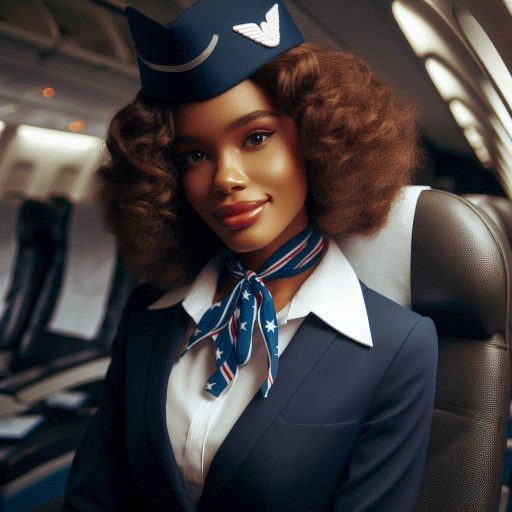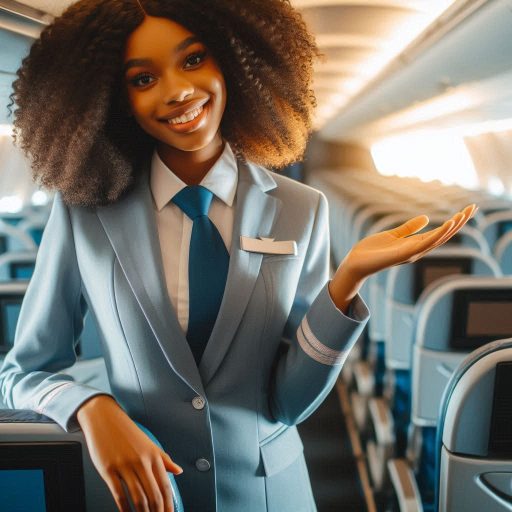Introduction
Choosing the right airline to work for as a flight attendant is a crucial decision that can significantly impact one‘s career trajectory and job satisfaction.
Flight attendants are the face of the airline, responsible for ensuring passenger safety and comfort while also handling a variety of in-flight situations.
Because of this, the airline‘s culture and values play a pivotal role in shaping the overall experience for flight attendants.
A supportive and positive work environment not only enhances job performance but also contributes to the emotional and psychological well-being of the crew.
Several key factors make an airline a desirable employer for flight attendants.
First and foremost, a strong company culture is essential.
Airlines that prioritize teamwork, collaboration, and open communication foster a sense of camaraderie among crew members.
This can lead to improved job satisfaction and a more enjoyable work environment.
Additionally, comprehensive training programs are vital for instilling confidence in flight attendants.
Well-trained crew members are better equipped to handle emergencies and provide excellent customer service, ultimately benefiting both the passengers and the airline.
Company Culture and Work Environment
The Importance of a Positive Company Culture for Flight Attendants
A positive company culture significantly impacts flight attendants’ job satisfaction and performance.
Flight attendants often face demanding schedules and various challenges.
Thus, a supportive work environment is essential for their well-being.
Airlines that prioritize company culture attract and retain talented employees.
When flight attendants feel valued, they deliver better service to passengers.
Airlines Known for Their Inclusive and Supportive Work Environments
Several airlines are known for fostering inclusive and supportive work environments.
Southwest Airlines consistently ranks high for employee satisfaction.
Their culture emphasizes teamwork, respect, and a fun atmosphere.
Employees often describe Southwest as a family, where everyone supports each other.
This positive environment translates to enthusiastic service for passengers.
Delta Air Lines also boasts a commendable company culture.
The airline prioritizes diversity and inclusion, celebrating employees from all backgrounds.
Delta regularly seeks feedback from flight attendants to improve working conditions.
This approach helps create an environment where employees feel heard and respected.
Employees appreciate the airline’s commitment to their well-being.
Another notable example is JetBlue Airways.
JetBlue promotes a culture of openness and honesty.
The airline encourages flight attendants to voice their opinions and share ideas.
This level of engagement fosters a sense of ownership among employees.
Consequently, flight attendants feel empowered to contribute to the company’s success.
Alaska Airlines ranks highly for employee satisfaction as well.
The airline promotes a collaborative atmosphere, focusing on teamwork and mutual support.
Flight attendants often express appreciation for the airline’s leadership and management.
Their strong commitment to employee development enhances job satisfaction.
Alaska Airlines frequently receives positive reviews from employees about its work environment.
Examples of Airlines with Great Employee Satisfaction Rates
Company culture also extends to employee benefits and recognition.
Airlines that offer competitive compensation and perks attract top talent.
For instance, Hawaiian Airlines is known for its excellent benefits package.
The airline offers generous vacation time and healthcare benefits.
This commitment to employee welfare creates a positive atmosphere for flight attendants.
In summary, a positive company culture is crucial for flight attendants.
Airlines like Southwest, Delta, JetBlue, and Alaska prioritize inclusive work environments.
These airlines foster support, respect, and engagement among employees.
By creating a culture that values flight attendants, these airlines enjoy high employee satisfaction rates.
As a result, they enhance the overall passenger experience through dedicated and motivated flight attendants.
Choosing to work for an airline with a strong company culture can lead to a fulfilling career.
Read: Nail Technician Etiquette: Dos and Don‘ts
Salary and Benefits
The Salary and Benefits Packages Offered by Different Airlines to Flight Attendants
Salary and benefits packages for flight attendants vary widely across airlines.
Understanding these differences is essential for anyone considering a career in this field.
Most airlines offer competitive salaries, but factors like experience and location can influence pay.
Flight attendants typically earn a base salary, along with additional pay for flight hours and duties.
Benefits packages often include healthcare, retirement plans, and paid time off.
For example, major carriers like Delta Air Lines and American Airlines provide comprehensive salary structures.
New flight attendants at these airlines can expect salaries starting around $30,000 to $40,000 annually.
As they gain experience, many earn between $50,000 and $80,000.
However, flight attendants at smaller regional airlines may earn lower starting salaries, generally in the range of $25,000 to $35,000.
Compare and Contrast the Compensation Packages of Top Airlines in the Industry
When comparing compensation packages, airlines like Southwest and JetBlue stand out for their competitive pay and benefits.
Southwest Airlines offers salaries comparable to major carriers, plus profit-sharing programs that benefit all employees.
This structure encourages a sense of ownership among flight attendants.
JetBlue is known for its attractive starting salaries and bonuses.
New flight attendants often begin with a salary around $30,000.
After gaining experience, they can earn upwards of $60,000.
JetBlue also provides unique incentives, such as additional pay for bilingual employees, further enhancing its compensation package.
In contrast, airlines like Spirit and Frontier may offer lower base salaries.
These airlines often emphasize a no-frills approach, resulting in less comprehensive benefits.
However, some budget airlines compensate for lower salaries with flexible schedules, which may appeal to certain employees.
Additional Perks Such as Travel Benefits and Healthcare Options
In addition to salary, flight attendants enjoy various perks that enhance their overall compensation.
Travel benefits are a significant draw for many in the industry.
Most airlines offer free or heavily discounted flights for employees and their families.
This perk allows flight attendants to explore new destinations without breaking the bank.
Healthcare options also play a crucial role in compensation packages.
Major airlines typically offer robust healthcare plans, including medical, dental, and vision coverage.
Delta, for instance, provides comprehensive healthcare options that cover employees and their families.
Additionally, many airlines offer retirement plans with company matching, ensuring financial security for flight attendants.
Salary and benefits packages for flight attendants differ across airlines.
Major carriers like Delta, Southwest, and JetBlue offer competitive compensation, while budget airlines may provide lower salaries.
Nevertheless, travel benefits and healthcare options can significantly enhance the overall appeal of a flight attendant’s job.
For aspiring flight attendants, understanding these factors is crucial when evaluating potential employers.
Read: Developing Patience and Precision in Pet Grooming
Career Growth Opportunities
The Opportunities for Career Advancement Within Different Airlines
Career advancement opportunities for flight attendants can vary significantly among airlines.
Many major carriers provide clear pathways for employees to grow within the organization.
Typically, flight attendants can progress from entry-level positions to senior roles, such as lead flight attendant or purser.
This progression often comes with increased responsibilities, higher salaries, and more influence over flight operations.
Airlines often promote from within, recognizing the value of experienced employees.
Those who excel in their roles may have the chance to move into management positions, training roles, or even corporate jobs.
The opportunities for advancement can depend on the individual‘s performance, tenure, and the airline‘s internal policies.
Airlines That Offer Training and Development Programs for Flight Attendants
Several airlines prioritize training and development for their flight attendants, enhancing career growth.
For example, Delta Air Lines offers extensive training programs that focus on safety, customer service, and leadership skills.
New hires undergo rigorous training to ensure they meet the airline’s high standards.
Southwest Airlines is another airline committed to employee development.
They provide ongoing training and workshops that equip flight attendants with the skills needed for career advancement.
Southwest also encourages mentorship programs, where experienced flight attendants guide newer employees, fostering a culture of support and growth.
JetBlue Airways also emphasizes training and development.
The airline offers various programs, including leadership training and continuous education opportunities.
These initiatives help flight attendants build their skills and prepare for potential promotions within the company.
The Potential for Promotions and Transitioning into Other Roles Within the Company
Flight attendants have ample opportunities for promotions and transitioning into other roles within their airlines.
Many airlines encourage employees to explore different career paths.
For example, flight attendants can apply for positions in ground operations, customer service management, or training and development.
Alaska Airlines actively promotes from within, allowing flight attendants to move into supervisory roles or corporate positions.
Employees often appreciate the flexibility to explore diverse career paths while remaining with the same airline.
Furthermore, airlines like American Airlines offer leadership development programs specifically designed for flight attendants.
These programs prepare them for management roles, ensuring they possess the necessary skills to lead effectively.
This commitment to internal career growth strengthens employee loyalty and satisfaction.
Career growth opportunities for flight attendants are abundant within the airline industry.
Major carriers like Delta, Southwest, JetBlue, and Alaska prioritize training and development.
These airlines provide clear paths for promotion and the chance to transition into various roles.
For aspiring flight attendants, these opportunities can make a significant difference in their career satisfaction and success.
Read: Tips for Nail Technicians Working in High-End Salons
Work-Life Balance
The Importance of Work-Life Balance for Flight Attendants
Work-life balance is crucial for flight attendants, given the demanding nature of their job.
Flight attendants often work irregular hours, including nights, weekends, and holidays.
This unpredictable schedule can impact personal lives and overall well-being.
Maintaining a healthy balance helps flight attendants manage stress, enhance job satisfaction, and improve performance.
Airlines that recognize the importance of work-life balance can foster happier, more productive employees.
A positive work-life balance allows flight attendants to recharge, spend time with family, and pursue personal interests.
When airlines support this balance, they help reduce burnout and retain talent.
Flight attendants who feel supported in their personal lives are more likely to provide exceptional service to passengers.
Airlines That Prioritize Employee Well-Being and Offer Flexible Scheduling Options
Several airlines prioritize employee well-being by offering flexible scheduling options.
For instance, Southwest Airlines provides flight attendants with the opportunity to bid for schedules based on their preferences.
This flexibility allows employees to manage their personal commitments effectively while fulfilling work responsibilities.
JetBlue Airways also emphasizes work-life balance.
The airline offers a bidding system for flight attendants to choose their schedules, accommodating personal needs and preferences.
Employees appreciate the ability to plan their lives around their work, which contributes to higher job satisfaction.
Alaska Airlines recognizes the importance of well-being as well.
The airline has initiatives to promote mental health and work-life balance.
They provide resources and support to help flight attendants navigate the challenges of their roles, ensuring employees feel valued and cared for.
Personal Anecdotes or Testimonials from Flight Attendants About Their Experiences with Work-Life Balance at Different Airlines
Many flight attendants share positive experiences regarding work-life balance at their respective airlines.
A flight attendant at Southwest Airlines mentioned, ‘The flexibility in scheduling allows me to be there for my family while still doing what I love.
I appreciate how my airline supports my personal life.
Another flight attendant from JetBlue shared, ‘Bidding for my schedule has made a significant difference in my life.
I can prioritize important events and still enjoy my work.
It feels great to have that control.
‘Conversely, some flight attendants have reported challenges in achieving work-life balance at budget airlines.
A flight attendant at a low-cost carrier noted, ‘The scheduling is less flexible, which sometimes makes it hard to plan personal commitments.
I wish there were more options to manage my time.
‘Work-life balance is vital for flight attendants’ well-being and job satisfaction.
Airlines like Southwest, JetBlue, and Alaska prioritize employee well-being through flexible scheduling options.
Personal testimonials highlight the positive impact of these initiatives on flight attendants‘ lives.
For those considering a career in this field, finding an airline that values work-life balance can lead to a more fulfilling experience.
Read: Understanding Pet Grooming Safety Standards

Safety and Security Measures
The Significance of Safety and Security Measures in the Airline Industry
Safety and security measures are paramount in the airline industry.
They protect passengers, crew members, and aircraft.
Given the complexities of air travel, implementing stringent safety protocols is essential.
Any lapse in safety can lead to serious consequences, including accidents and security breaches.
Airlines must prioritize these measures to ensure the well-being of everyone on board.
The significance of safety extends beyond regulations.
It builds trust with passengers, enhancing their overall travel experience.
When travelers feel safe, they are more likely to choose an airline again.
Therefore, a strong commitment to safety and security is vital for the airline’s reputation and success.
Airlines That Are Known for Their Commitment to Passenger and Employee Safety
Several airlines are recognized for their unwavering commitment to safety.
For instance, Delta Air Lines consistently ranks among the safest airlines globally.
Delta invests heavily in safety training, technology, and maintenance.
Their comprehensive approach ensures that both passengers and crew members are well protected.
Singapore Airlines also has a stellar safety record.
The airline prioritizes safety through rigorous training programs for flight attendants and pilots.
Singapore Airlines‘ commitment to passenger and employee safety is evident in its operational protocols, which adhere to the highest international standards.
Alaska Airlines is another carrier known for its focus on safety.
The airline regularly updates its safety practices and conducts thorough training sessions for employees.
Their proactive approach helps maintain a safe working environment for flight attendants.
The Training and Protocols in Place to Ensure a Safe Working Environment for Flight Attendants
Training is a critical component of safety in the airline industry.
Flight attendants undergo extensive training before their first flight.
This training includes emergency procedures, first aid, and conflict resolution.
Airlines emphasize the importance of being prepared for any situation that may arise during a flight.
For example, flight attendants at Southwest Airlines participate in regular safety drills and refresher courses.
These sessions ensure that they remain knowledgeable about the latest safety protocols.
Southwest also encourages open communication among crew members to address safety concerns promptly.
Additionally, airlines implement strict security protocols to protect flight attendants while on duty.
These measures include thorough screening processes at airports, collaboration with law enforcement, and monitoring of onboard behavior.
By prioritizing safety and security, airlines create a safer working environment for their flight attendants.
Safety and security measures are critical in the airline industry.
Airlines like Delta, Singapore Airlines, and Alaska Airlines exemplify commitment to safety for both passengers and employees.
Extensive training and robust protocols ensure that flight attendants work in a secure environment.
For flight attendants, knowing their safety is prioritized allows them to focus on providing exceptional service.
Transform Your Career Today
Unlock a personalized career strategy that drives real results. Get tailored advice and a roadmap designed just for you.
Start NowLearn More: Average Salary for Pest Control Workers in the US
Uncover the Details: Receptionist Dress Code: Professionalism Tips
Company Reputation
The Reputation of Different Airlines Within the Industry and Among Employees
The reputation of an airline significantly influences its standing in the industry and among employees.
Airlines that consistently deliver excellent service and maintain high safety standards often enjoy positive reputations.
In contrast, airlines with frequent customer complaints or safety concerns may struggle to attract talent.
Reputation can be evaluated through various factors, including customer satisfaction ratings, industry awards, and employee reviews.
Airlines like Delta, Southwest, and Singapore Airlines frequently rank high in customer satisfaction surveys.
Their commitment to service excellence has earned them numerous awards, further solidifying their positive reputations.
On the other hand, airlines with a history of low customer satisfaction ratings may face challenges.
For example, budget airlines that prioritize cost-cutting over service often receive mixed reviews.
This can lead to difficulties in attracting skilled flight attendants who prefer to work for reputable carriers.
Factors Such as Customer Satisfaction Ratings, Industry Awards, and Employee Reviews
Customer satisfaction ratings play a vital role in assessing an airline’s reputation.
Airlines that prioritize customer service and consistently meet or exceed passenger expectations generally receive higher ratings.
For instance, Southwest Airlines often ranks highly for its friendly service and reliable operations, making it a preferred employer for many flight attendants.
Industry awards also reflect an airline’s reputation.
Airlines recognized for excellence in customer service, innovation, and safety often attract top talent.
For example, Singapore Airlines has won numerous awards for its premium service, which enhances its reputation as an employer of choice.
Employee reviews on platforms like Glassdoor and Indeed provide valuable insights into an airline’s work environment.
Airlines with positive reviews regarding management, company culture, and work-life balance are more likely to attract dedicated flight attendants.
Conversely, airlines with negative reviews may struggle to retain employees and build a strong team.
How a Positive or Negative Reputation Can Impact a Flight Attendant’s Experience Working for a Specific Airline
A positive reputation can greatly enhance a flight attendant’s experience.
Airlines known for their excellent service often cultivate a supportive work environment.
Flight attendants at reputable airlines frequently report higher job satisfaction, increased morale, and better teamwork.
They take pride in working for a company recognized for its commitment to passengers and employees.
Conversely, a negative reputation can lead to challenges for flight attendants.
Those working for airlines with poor customer service ratings may face increased stress from unhappy passengers.
This can create a tense working atmosphere, impacting job satisfaction and overall well-being.
Additionally, flight attendants may find it difficult to promote the airline to friends and family, leading to diminished pride in their work.
The reputation of an airline is crucial for its success in the industry and among employees.
Factors such as customer satisfaction ratings, industry awards, and employee reviews contribute to this reputation.
A positive reputation fosters a supportive work environment, enhancing flight attendants’ experiences.
In contrast, a negative reputation can lead to challenges that affect job satisfaction and overall morale.
For aspiring flight attendants, considering an airline‘s reputation is essential when making career choices.
Explore Further: How to Find a Locksmith You Can Trust
Diversity and Inclusion Initiatives
The Diversity and Inclusion Initiatives of Various Airlines
Diversity and inclusion initiatives have gained significant traction in the airline industry.
Many airlines recognize the importance of creating a workforce that reflects the diverse communities they serve.
These initiatives often include targeted recruitment strategies, employee resource groups, and comprehensive training programs.
Airlines are increasingly committed to fostering inclusive environments where all employees feel valued and respected.
For example, American Airlines has implemented various programs to promote diversity.
The airline actively seeks to recruit candidates from underrepresented backgrounds.
They also provide unconscious bias training to all employees, fostering a culture of awareness and acceptance.
This commitment enhances the overall work environment and improves employee relations.
Delta Air Lines is another airline that prioritizes diversity and inclusion.
Delta has established initiatives focused on gender equity, racial diversity, and LGBTQ+ inclusion.
The airline’s employee resource groups provide support and networking opportunities for employees from diverse backgrounds, enhancing their sense of belonging.
The Importance of a Diverse and Inclusive Workplace for Flight Attendants
A diverse and inclusive workplace is vital for flight attendants and the airline industry as a whole.
A varied workforce brings different perspectives, ideas, and experiences, enriching the work environment.
This diversity can lead to enhanced problem-solving and creativity, ultimately benefiting passengers.
For flight attendants, a supportive and inclusive culture promotes job satisfaction and employee retention.
When flight attendants feel valued for their unique contributions, they are more likely to perform at their best.
Moreover, a diverse team can relate to a wider range of passengers, improving customer service and satisfaction.
Inclusivity also fosters a sense of community among employees.
Flight attendants who work in environments that embrace diversity often report feeling more connected to their colleagues.
This camaraderie enhances teamwork and cooperation, contributing to a positive work atmosphere.
Airlines That Prioritize Diversity and Equality in Their Hiring Practices and Company Culture
Several airlines have made significant strides in promoting diversity and equality in their hiring practices and company culture.
United Airlines is a notable example, having launched a comprehensive diversity and inclusion strategy.
The airline actively works to recruit a diverse workforce and holds leaders accountable for fostering inclusive environments.
Southwest Airlines is also recognized for its commitment to diversity.
The airline has set measurable goals for hiring and promoting diverse candidates.
Southwest encourages an inclusive culture where employees can share their perspectives and experiences openly.
JetBlue Airways emphasizes diversity and inclusion in its hiring practices.
The airline conducts regular reviews of its diversity metrics and offers training to employees to promote a culture of respect and understanding.
JetBlue’s commitment to these initiatives helps create a workplace that celebrates differences and encourages collaboration.
Diversity and inclusion initiatives are increasingly important in the airline industry.
Airlines like American, Delta, United, Southwest, and JetBlue prioritize these values in their hiring practices and company culture.
A diverse and inclusive workplace enhances job satisfaction for flight attendants and leads to improved customer service.
For aspiring flight attendants, choosing an airline that values diversity can lead to a more fulfilling and supportive career.
Conclusion
Selecting the best airline to work for as a flight attendant requires careful consideration and thorough research.
We discussed several key factors that influence job satisfaction, including company culture, employee benefits, and opportunities for career advancement.
Airlines like Delta, Southwest, and Emirates consistently rank high for employee satisfaction due to their strong support systems and positive work environments.
Each airline offers unique advantages, so it‘s crucial to evaluate what matters most to you.
For some, competitive pay and robust benefits packages are priorities.
For others, work-life balance and flexible schedules might take precedence.
Additionally, consider the training programs available, as well-prepared flight attendants often experience greater job satisfaction.
It‘s essential to research each airline thoroughly before making a decision.
Speak with current and former flight attendants to gain valuable insights into their experiences.
Utilize online forums and social media groups to gather information about the work culture at different airlines.
Ultimately, choose an airline that aligns with your personal values and long-term career goals.
A positive work environment can significantly enhance your job satisfaction and overall experience as a flight attendant.
Take your time to evaluate your options, considering all factors that contribute to a fulfilling career.
With the right airline, you can enjoy a rewarding journey in the skies.
Happy flying!




